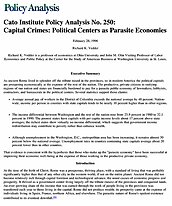- Average annual pay of workers in the District of Columbia exceeds the national average by 48 percent. Nation-wide, income per person in counties with state capitals tends to be nearly 10 percent higher than in other regions.
- The income differential between Washington and the rest of the nation rose from 25.9 percent in 1980 to 32.1 percent in 1990. The poorest states have capitals with per capita income levels about 17 percent above state averages; the richest states show virtually no income differential, which suggests that government income redistribution may contribute to poverty rather than enhance wealth.
- Although unemployment in the Washington, D.C., metropolitan area has been increasing, it remains almost 30 percent below the national average. Unemployment rates in counties containing state capitals average about 20 percent lower than in other counties.
That evidence is consistent with the hypothesis that those who make up the “parasite economy” have been successful at improving their economic well-being at the expense of those working in the productive private economy.

